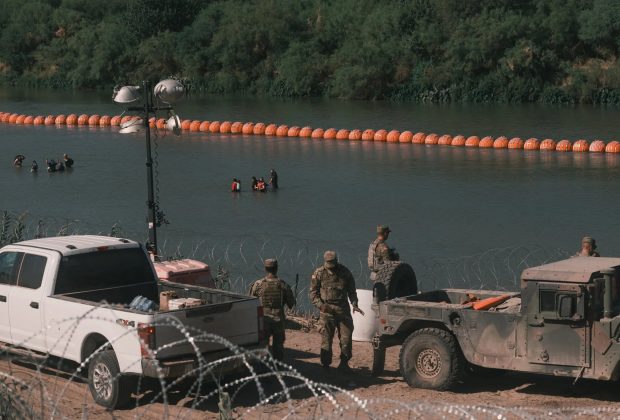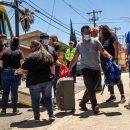Gov. Greg Abbott’s intensive campaign to turn back migrants was initially welcomed on the border. But in Eagle Pass, the effort’s main focal point, residents are having second thoughts.
By Edgar Sandoval | The New York Times | AUG. 22, 2023 | Photo by Jordan Vonderhaar
When Gov. Greg Abbott of Texas announced a multibillion-dollar initiative two years ago to deter migrants crossing from Mexico, the border city of Eagle Pass was seeing 1,200 people coming into town every day, and many residents welcomed the extra aid.
Hugo Urbina, who owns a pecan farm next to the Rio Grande, was unhappy with the constant foot traffic on his land, sometimes dozens of people a day. Jessie Fuentes, who owns a canoe and kayak business, did not want migrants to think America had an “open border.” The town’s mayor, Rolando Salinas Jr., saw the Border Patrol being overwhelmed.
“People cannot be arriving by the thousands without consequence,” Mr. Urbina said.
But over time, as Governor Abbott has tested the legal limits of state action on immigration — sending the National Guard and scores of state troopers to the border, and installing razor wire and floating barriers along the river — some of that popular support appears to be waning.
The recent reports of injuries and at least two deaths near the 1,000-foot string of river buoys has raised the level of concern. “He went too far,” Mr. Fuentes said.
The escalated tactics under what the state has called a “hold the line” operation has even drawn some criticism from within the Texas Department of Public Safety and the Border Patrol.

In interviews, some Eagle Pass residents said it has come to feel as if their own town is under siege, with state troopers stationed along the riverbanks warning those trying to cross to turn back.
In a hearing on Tuesday in federal court in Austin, the Justice Department asked a judge to order the removal of the river barrier, which the department contended violated a law that gives the federal government jurisdiction over navigable waterways.
The department also said a significant portion of the barrier was located in Mexican territory and had prompted objections from the Mexican government. The government later reported that Texas sent a crew last week to move the buoys closer to U.S. territory.
The state’s Department of Public Safety has said the border control measures are intended to discourage migrants from crossing in dangerous sections of the river and entering the country without authorization to request asylum. Instead, department officials said, the state operation urges border crossers to enter more safely at a legal port of entry.
In a letter to President Biden in July, Mr. Abbott said his officers were protecting against the threat of illegal drugs, human trafficking and cartel violence on the border, as well as ensuring that migrants cross more safely. “Your open-border policies encourage migrants to risk their lives by crossing illegally through the water, instead of safely and legally at a port of entry,” he wrote.
Judge David Ezra of the U.S. District Court in Austin said he would wait until lawyers submitted final arguments in writing at the end of the day on Friday before making a decision on the river barrier “as quickly as I can.”
He said his ruling would adhere strictly to “the facts and the law.”
“I’m not here to engage in any kind of political comment in this decision,” he said.
In Eagle Pass, state officials have made it clear that they intend to continue their border operations, at least on the river’s shores, as long as they feel they are needed.
Lt. Christopher Olivarez, a spokesman for the public safety department, said landowners who had agreed to cooperate with the initiative were expected to lend their land to the operation until it wound down. Plans for Operation Lone Star, as the state operation is known, are “indefinite,” Lieutenant Olivarez said.
But many residents who own land near the Rio Grande said the state law enforcement agents had already overstayed their welcome. While he initially agreed to cooperate, Mr. Urbina said he had watched in dismay as state troopers had “completely taken over” his land.
The local migrant shelter has reported that many migrants are arriving with serious lacerations from the razor-wire barriers, and Mr. Urbina is concerned that some of those injuries are occurring on his land. “We don’t want to see people get hurt,” he said.
“I want to be clear that we support the aspect that we need to have some kind of border control. But they have taken over this whole area,” he said.
Mr. Fuentes, a fixture in Eagle Pass known for his Indiana Jones-style hat and large mustache, said he had been cautiously optimistic about Governor Abbott’s efforts two years ago, when Border Patrol processing centers and Eagle Pass’s lone migrant respite center were overloaded. But he said he had also become concerned as the state’s tactics for countering the migrants had escalated.

He said he felt heartbroken recently when he saw a group of women and children struggling to climb onto an island in the river that had been “completely razed” by heavy state equipment. “They were desperate, trying to get to this side,” he said. “They had no place to turn to.”
Local residents expressed their frustration this month to a delegation of Democratic members of Congress and state elected officials who traveled to see the operation firsthand. Representative Joaquin Castro, who represents San Antonio, said he was troubled to hear that Governor Abbott’s program was improperly interfering in an area that is under federal jurisdiction, using land that belongs to private citizens.
“What he likes to do is scare Texans that there’s a bunch of people coming across the river coming here to harm you,” Mr. Castro said.

City officials have also become less welcoming of the state operation.
Mr. Salinas, the mayor of Eagle Pass, who once publicly proclaimed his support for Operation Lone Star and still supports an increased law enforcement presence at the border, said he had soured on the more aggressive tactics lately on display.
Mr. Salinas said he initially agreed to allow state police to make many migrant arrests on city-owned land in Shelby Park. But local residents, fed up with the park being unavailable to them, pushed the Eagle Pass City Council recently to revoke that permission.
Mr. Salinas said he had declined a recent request from the state to construct a gate on a boat ramp near the river.
“They said, ‘Well, we just wanted to ask you. We are going to put it in anyway because we are under an emergency declaration by the governor. That’s our authority,’” he said.
He said that decisions about immigration needed to come from Washington, not just the state, and that they were about more than providing additional security on the border.
“We do not have the answers at the local level,” he said. “The federal government needs immigration reform. That’s been talked about for the last 30 years.”







